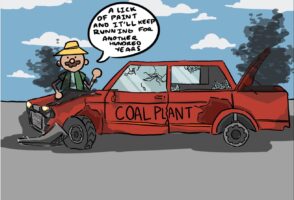Renewable electricity generation has surged to new highs in 2020, but a rapid rebound in transport sector emissions has further underlined the need for a national electric vehicle strategy, according to the latest edition of the National Energy Emissions Audit published by The Australia Institute.
The November edition of the monthy audit found emissions in the electricity sector continued to fall throughout 2020, primarily due to continued growth in output from wind and solar projects. In the year to October, renewable energy sources supplied almost 27 per cent of the National Electricity Market, setting a new annualised record.
The report noted that daily renewable generation set a new record on 2 October, reaching 38.3 per cent, with the share of renewables peaking during the middle of that day at 53.8 per cent.
Conversely, the report found that the share of coal generation in the Australian electricity grid continued to fall to new record lows.
“Seen in the context of the entire history of the electricity supply industry in Australia, dominated, except in Tasmania, by coal generation by well over a hundred years, every reduction in the share of coal generation is also a fall to a new record low level,” the report says.
While the report found renewables continued their strong growth, trends in other parts of the economy, particularly the transport sector, highlighted how gaps in government policy had failed to lock-in long-term reductions in Australia’s emissions footprint.
According to the report, emissions from petroleum emissions fell by 5.4 million tonnes in the period to June 2020, with emissions falling by a further 4.2 million tonnes between July and September, caused primarily by lockdowns in Victoria.
However, report author Dr Hugh Saddler said data suggests the sharp drop in transport emissions triggered by Covid-19 related travel restrictions was quickly reversing, as the movement of people began returning to normal levels.
“When it comes to energy consumption, the largest impact of the pandemic and subsequent economic slow-down has fallen on petroleum products, reflected by a significant drop in emissions from the transport sector,” Saddler said.
“While major impacts on aviation fuel emissions continue, the massive reduction in fossil fuels used by passenger and light commercial motor vehicles during the pandemic is quickly reversing. Changed economic conditions have had no significant effect on consumption of either electricity or gas, even with an economic slow-down as prolonged as that in Victoria.”
The Australia Institute said that the results showed the need for stronger government policies for reducing emissions in the transport sector.
“It should not take a national crisis to reduce emissions in the transport sector when there are numerous available abatement opportunities in transport. If anything, this analysis demonstrates what could be, if Australia were to transition away from fossil fuelled transport by implementing an electric vehicle policy, similar to those in Nordic Countries,” The Australia Institute’s climate and energy program director Richie Merzian said.
“We have now seen first-hand the impact actions, like reducing the number of fossil fuelled cars on the road, can have on national emissions. The problem and solutions are clear, now, we just need our Governments to put in the work.”
The transport sector accounts for around a fifth of Australia’s greenhouse gas emissions and had been trending steadily higher year-on-year until the impacts of the Covid-19 pandemic saw transport emissions fall by around a quarter in the first half of 2020.
The Morrison government has backed away from a plan to release a dedicated National Electric Vehicle Policy, and will instead release a ‘future fuels’ strategy that will look more broadly at the role of alternative fuels, including hydrogen and biofuels.
Electric vehicle advocates have argued that Australia runs the risk of becoming a dumping ground for the world’s most polluting vehicles if the government fails to introduce policies to support the uptake of zero emissions vehicles and stricter fuel efficiency standards.











